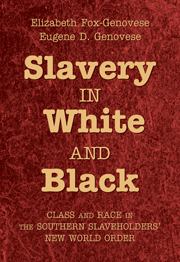Book contents
- Frontmatter
- Contents
- Preface
- Manuscript Collections Cited
- List of Abbreviations
- Slavery in White and Black
- Introduction
- 1 The Impending Collapse of Capitalism
- 2 Hewers of Wood, Drawers of Water
- 3 Travelers to the South, Southerners Abroad
- 4 The Squaring of Circles
- 5 The Appeal to Social Theory
- 6 Perceptions and Realities
- Afterword
- Index
Afterword
Published online by Cambridge University Press: 05 June 2012
- Frontmatter
- Contents
- Preface
- Manuscript Collections Cited
- List of Abbreviations
- Slavery in White and Black
- Introduction
- 1 The Impending Collapse of Capitalism
- 2 Hewers of Wood, Drawers of Water
- 3 Travelers to the South, Southerners Abroad
- 4 The Squaring of Circles
- 5 The Appeal to Social Theory
- 6 Perceptions and Realities
- Afterword
- Index
Summary
You are not obliged to complete the work, but neither are you free to evade it.
—Rabbi TarfonThe long gestating doctrine of Slavery in the Abstract had deep roots in the Old South. Its branches spread widely if unevenly. George Fitzhugh of Virginia alone offered the extraordinary if ultimately utopian insight that to prevail, a slaveholding world had to destroy the world market and dismantle the capitalist system. Henry Hughes of Mississippi advanced a more practical view that pointed toward twentieth-century doctrines of the corporate state. Despite a common defense of Slavery in the Abstract, their specific formulations pointed in opposite directions: the one backward, the other forward. Yet Fitzhugh, Hughes, Thomas Roderick Dew, and George Holmes shared with the South's leading theologians, social theorists, and political spokesmen certain convictions: Free society had failed; the laboring classes needed to be subjected to personal servitude; and corporatism, not individualism, was the lesson of the past and the wave of the future. They projected a new world order based on the subjugation of labor to individual masters, however much they implicitly disagreed about the proper relation of those masters to the state.
Were we to credit postwar pronouncements, we might wonder how slavery survived so long with so few adherents. But those who issued disclaimers were kind enough to leave behind their antebellum writings, speeches, and – much more revealing – their private diaries and letters, which tell a different story.
- Type
- Chapter
- Information
- Slavery in White and BlackClass and Race in the Southern Slaveholders' New World Order, pp. 289 - 294Publisher: Cambridge University PressPrint publication year: 2008



